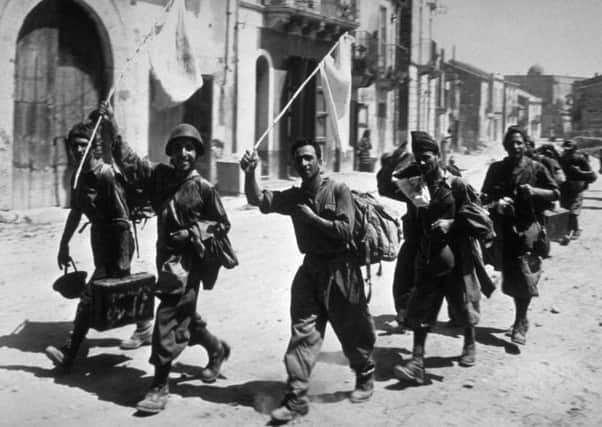Book review: In the wolf’s mouth


This is Adam Foulds’s third novel. The two previous ones, The Truth About These Strange Times and The Quickening Maze have both won prizes and been shortlisted for other ones, and it would be no surprise if this new novel is equally successful. It is ambitious. It is a novel partly about war – in North Africa and Sicily – partly about post-war reconstruction in that island, and – inevitably – the Mafia.
It begins with a very well-written prologue in 1926. Angilu, a young shepherd in the countryside about Palermo, is warned by a guard that men will come to take away some of his sheep, and it would be better to make no resistance. He understands what this means. When the thieves come, he agrees to let himself be tied up. It is the second theft. He has reported the first one to his superior, Ciro Albanese, the Gabellotto (translated here as “landlord”, who, as a Man of Respect (a Mafioso, in other words) knows about it already.
Advertisement
Hide AdThe second time, he goes to the landowner, the Prince, and wins his respect and protection. Meanwhile, the Mafia are in difficulties. Italy is now a Fascist state, and Mussolini has resolved to suppress the Mafia. As the great Sicilian novelist, Leonardo Sciascia, pointed out, it is a paradox that the regime which enslaved Italy brought a sort of freedom to many Sicilians: Angilu is one of them. Albanese, on the other hand, is smuggled out of Sicily in a coffin, to pursue his criminal career in New York.
The second and least satisfactory part of the novel is set in 1942-3 and deals with the Allied landings in French North Africa. The two main characters are Ray, an Italian-American, with a passion for the cinema, and Will, an Englishman serving in field security. The description of the fighting is well enough done, but it is something done so often in novels, memoirs and histories, that Foulds is unable to make it ring new.
Neither Ray nor Will has any real understanding of what is happening; Will even naively responds to Arab complaints against the French by supposing that the country may be acquired by Britain as a new territory of the Empire. This is a nice illustration of the fog of war.
The novel picks up and become very good when it moves to Sicily, though even in this section Ray’s experiences are reported at excessive and unconvincing length. But Foulds dramatises the confusion of the time very well. The Americans have recruited “experts” from the criminal elements of the Italian community in the States and brought them to Sicily to provide them with local knowledge which will help them defeat the Germans and the Italian fascists and establish the Allied Military Government of Occupied Territories.
Ciro Albanese is one of those who returns, determined to reclaim what was his, and be revenged on those who supplanted him; this includes the man his wife has married, believing that he himself was dead. It is a time for retribution, and Foulds recounts the form this takes in chilling and compelling detail.
At first Will is impressed by Albanese and the more senior Mafiosi, who had been imprisoned by Mussolini and therefore can be seen as innocent victims of fascism. In the course of a few weeks, however, he will come to understand a lot more about them.
Advertisement
Hide AdHe is a decent man, not however equipped to find his way through the maze in which he finds himself. One of the books he has taken with him to war is The Wind in the Willows, but Sicily is rather more complicated than the Riverbank (though Mole’s frightening experiences in the Wild Wood might have prepared him for what he finds there).
The part played by the Allies in re-establishing the Mafia, and thus preparing for its long and brutal domination of Sicilian life, in partnership with the Christian Democrat Party, which relied on the Mafia to deliver the votes, and rewarded it by turning at least a blind eye to its activities, is as well documented – by Norman Lewis and Joe Farrell among other English-language writers, and of course by Sciascia – as it is shameful and deplorable. Foulds dramatises it movingly, and doesn’t shrink from exposing the ghastly consequences.
Advertisement
Hide AdIf the novel is less than a complete success, it is because Ray’s story lacks the interest and authority of Will’s, and serves, it seems , to do little more than emphasise, at excessive length, his unpreparedness for the experience of war and his naivety. As a character he never quite comes to persuasive life. It is often difficult for a novelist to marry the stories of principal characters whose experiences are different and who do not come together, and one can’t avoid the thought that this would have been a better novel if Ray had been cut out altogether.
That said, the prologue is excellent and the novel becomes powerful and persuasive when it concerns itself with the Sicilian characters and with Will’s attempts to come to an understanding of this very different society in which he has been landed by the winds of war. And Foulds’s portrayal of the Mafia mentality, and how this is expressed in action, is as admirable as it is disturbing. Structurally then, the novel is a bit of a mess, but its best parts are very good.